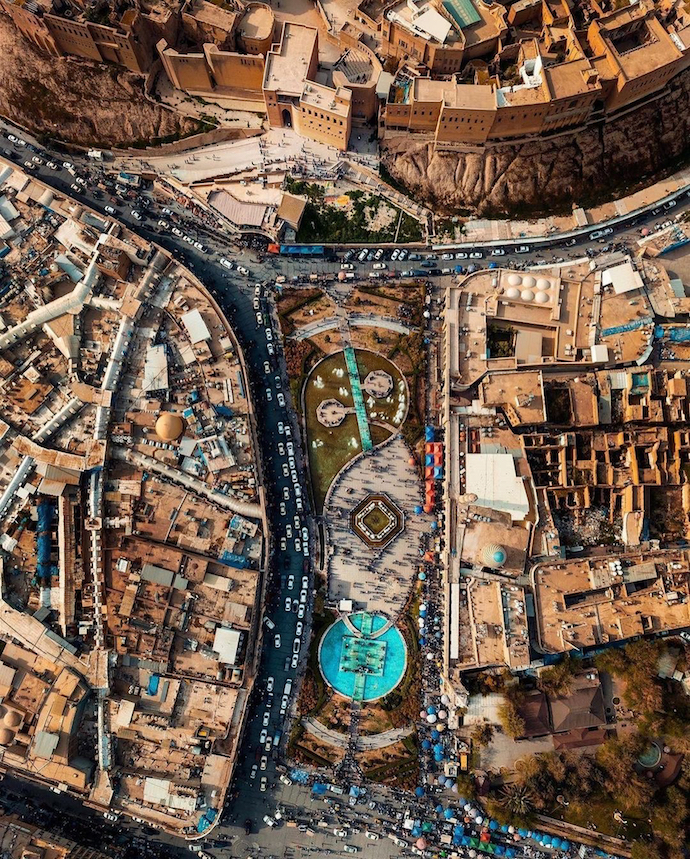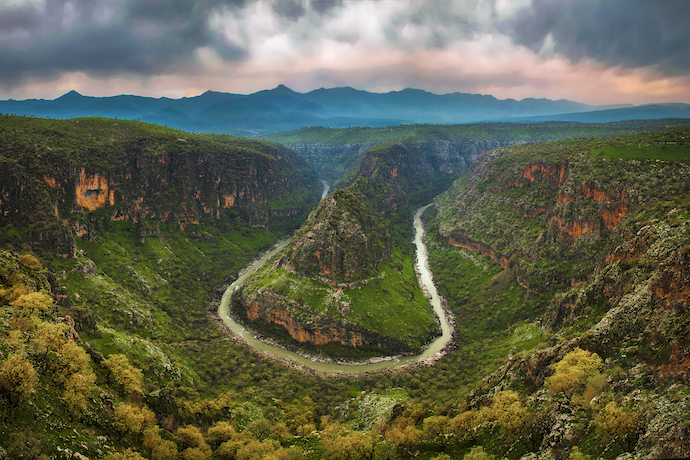The Platform
Latest Articles
by Abdul Mussawer Safi
by Mohammad Ibrahim Fheili
by James Carlini
by Mohammad Ibrahim Fheili
by Abidemi Alade
by Sheiknor Qassim
by Theo Casablanca
by Vince Hooper
by Samita Sajeevan
by Abdul Mussawer Safi
by Mohammad Ibrahim Fheili
by James Carlini
by Mohammad Ibrahim Fheili
by Abidemi Alade
by Sheiknor Qassim
by Theo Casablanca
by Vince Hooper
by Samita Sajeevan
The Geopolitics of Iraqi Kurdistan Natural Gas: A Stalemate or a Shift in Perspective?
Energy reserves in Iraq Kurdistan could transform the region. For that to happen, several complications have to be overcome.
In Iraqi Kurdistan, the roots of its oil infrastructure remain firmly entrenched. The Kurdistan Regional Government (KRG) oil pipeline, originating from the Taq Taq field, stretches 81 kilometers to connect with the Khurmala Dome. Completed in 2014, the 281-kilometer pipeline runs from the Khurmala field to Pesh Kabir (Fesh Khabur) on the Turkish border, where it links with the Kirkuk-Ceyhan pipeline.
Initially designed to transport 700,000 barrels of oil daily, a 2017 deal with Rosneft signaled intentions to expand capacity to 950,000 barrels per day, though confirmation of this development remains pending.
The KRG’s Ministry of Natural Resources estimates that the region holds roughly 5.7 trillion cubic meters of natural gas. This includes 25 trillion cubic feet of proven gas and 198 trillion cubic feet of unproven gas. The former category comprises reserves with over 90% confidence, while the latter includes less certain reserves that could be verified with advanced techniques.
Projections affirm that natural gas will play an increasingly vital role in energy markets, especially in the pursuit of zero-carbon policies and environmental stewardship.
In a significant step, the United States provided $250 million to the Khor Mor gas field in 2021, aiming to enhance gas exports in the region. The expectation is for the field to produce 750 million cubic feet per day by the end of 2024 and a million cubic feet per day in subsequent years.
Since 2007, Dana Gas and Crescent Petroleum, two UAE energy corporations, have collaborated with the KRG in operating the Khor Mor bloc. This operation is vital to the region’s economy, supplying 500 million standard cubic feet of natural gas per day. In the first half of 2023, production rose by 6%, reaching 1,900 barrels of condensate per day, and overall field production is at 20,000 barrels per day. This field is poised to satisfy most of the region’s liquefied natural gas requirements, powering millions of homes and businesses in the Kurdistan Region and Iraq.

Yet, continuing internal division and political strife in the Kurdistan Region have clouded the natural resource management scenario. Since 2003, the absence of robust political, economic, military, and scientific institutions has led to a distorted vision of the region’s energy sector.
Turkey’s role in the KRI’s hydrocarbon sector is a pivotal issue. The relationship between Ankara and the Kurdistan Regional Government demonstrates Turkey’s potential influence over policy in Baghdad through the KRG. Geopolitically, Turkey has leaned on the KRG to counterbalance Iran’s influence and that of the Kurdistan Workers’ Party in Syria.
However, a 2013 complaint by Baghdad to the International Court of Arbitration (ICC) resulted in a March ruling that halted oil exports from the Kurdistan Region to Turkey’s Ceyhan Port. This ruling coincided with a February 2022 decision by Iraq’s highest court, deeming the Kurdistan Regional Government’s oil and gas law unconstitutional. This double blow put the Kurdish oil and gas industry at risk and left the KRG protesting the rulings as “unjust” and “unconstitutional,” casting a shadow over future energy cooperation in the region.
As tensions rise, Baghdad has issued warnings to multinational energy firms operating in the Kurdistan Region, urging them not to engage further. Meanwhile, multiple disputes against the region persist.
In July, Iraq generated only 20.8 megawatts of electricity, falling drastically short of meeting domestic demand. To bridge this gap, about 40% of electricity is imported from Iran, at prices exceeding the global market average. Annually, Iraq spends roughly $4 billion on electricity from Iran.
Though the country possesses an estimated gas reserve of 125.6 trillion cubic feet (contributing 1.8% to the global total), it ranks eleventh worldwide. A staggering $290,000 of gas is wasted every hour according to the World Bank, amounting to about $2.5 billion a year. This not only pollutes the environment but also infuses toxic substances into the atmosphere.
In 2023, Baghdad will require 25 to 30 million cubic meters of gas daily for its central and southern provinces. A dearth of energy production contributes to the loss of approximately $40 billion annually from the Iraqi economy, with these losses manifesting in the extensive funds spent by Iraqis on energy, as well as damage to industrial, and agricultural sectors, and health problems caused by frequent power outages.
The United States, through sanctions, has prevented dollars from reaching Iran and Russia in a bid to decrease oil and gas sales revenues. Consequently, $2.7 billion of Iranian funds have been held in the Trade Bank of Iraq (TBI). Various Iraqi banks and figures have been blacklisted by the Biden administration for transferring dollars to Iran and Russia.
Iraq’s current government, formed after two early elections and several demonstrations, does not represent the majority of its citizens. This political misrepresentation has been described as “The Hijacking of Democracy” by the Wilson Centre. A crisis ensued in July when temperatures soared to 122° Fahrenheit in some Iraqi provinces, and Iran cut off electricity. Washington has since committed to repaying the electricity loan to Iran within 120 days through non-Iraqi banks, but will it be enough to salvage Iraq?
On July 14, Iraq and Iran entered into a unique agreement wherein Iran will supply natural gas to Iraq, and Iraq will reciprocate with 250,000 barrels of oil. This deal is set to continue until the end of the year. However, the rationale behind Iran’s need for Iraqi oil remains unclear, given its vast reserves.

The recent alignment of Turkey, the Kurdistan Regional Government (KRG), and the Gulf countries demonstrates a collaborative effort to strengthen ties. Various missile and drone attacks have been launched on the Kurdistan Region’s energy fields by Iran and Shiite militia groups in Iraq. The international community’s support will be required to maintain Kurdistan’s energy infrastructure.
Further interactions between the UAE, KRG, and the Gulf Cooperation Council may significantly shift regional geopolitics and economic order. The recent improvement in Turkey-Gulf relations is also noteworthy.
Baghdad’s maneuvering hinges on Iran’s consent. Meanwhile, the Kurdistan Region must consider Turkey’s stance regarding any economic and political realignments. The KRG and its gas reserves may not appear appealing to the Gulf, but a planned pipeline to Turkey demands support from Baghdad and the international community.
Moreover, Gulf countries such as Saudi Arabia are becoming more influential players in Iraq, thanks in part to alliances with Iraq’s current Sunni leaders. Investment waves in Kurdistan’s gas and oil capacity are evident, along with Saudi Aramco’s engagement in the Anbar Province.
Outside the GCC’s energy geopolitics, there lies the Eastern Mediterranean Gas Forum (EMGF). Almost all Eastern Mediterranean countries possess natural reserves and are members of the EMGF founded in 2017, with the conspicuous exception of Turkey. Also, France, Italy, Greece, and Spain are considering active roles in the Eastern Mediterranean gas project.
The shifting landscape of energy politics in the region presents a complex interplay of alliances, investments, and strategic maneuvers. Whether this is indicative of a deadlocked scenario, or a new era of collaboration and understanding will require careful observation and analysis.
Since 2010, significant natural gas discoveries off the coasts of Cyprus and Israel have transformed both countries from energy importers to exporters. A 1,900-kilometer pipeline was constructed at a cost of $6.7 billion. The energy ministers of Greece, Israel, and Cyprus finalized the pipeline project in 2020. The West openly embraces the project as an alternative to Russian gas while simultaneously fostering plans to expand the Eastern Mediterranean into a more significant energy production zone, thereby enhancing regional security and stability.
Interestingly, the United Arab Emirates has also become involved in the Eastern Mediterranean. Though geographically removed from the Mediterranean, the UAE joined the Eastern Mediterranean Gas Forum (EMGF) as an observer in 2020, fostering diplomatic relations with Tel Aviv and Abu Dhabi. By September 2021, the UAE’s Mubadala Petroleum purchased a 22% stake in the Israeli Tamar gas field for about $1 billion.
Geographically closer to the Eastern Mediterranean basin, the Kurdistan Region and West Kurdistan’s involvement are more intricate. Their participation in the EMGF is anticipated, particularly after Turkey’s reconciliation with Israel and Egypt, the forum’s two main proponents.
In international relations theory, realism emphasizes power and survival. It focuses on national interest, power acquisition, competition, and the anarchic nature of international relations. This view perceives a balance of power as desirable, preventing domination by another state and leading to enhanced security. As illustrated by Hans Morgenthau in his seminal book, Politics Among Nations, the state holds the primary role in realism.
The Kurdistan Region faces challenges. Political corruption and division have weakened its stance. Its existence for 32 years without a constitution, unified military force, or scientific research institutions reflects a region fraught with political fragmentation. Ongoing disputes with the Iraqi government further complicate matters.
Iraq’s political economy remains in disarray, with vast sums squandered and persistent corruption. The recent passage of a budget, revealing a 25% deficit, illustrates the country’s perilous financial situation. Environmental challenges compound these problems, with significant losses in water revenue, agricultural land, and displacement of families due to climate change.
The Kurdistan Region must reevaluate its policies to ensure energy security. The foundation of a new vision involves addressing internal issues and not standing idle before accumulating challenges. The leaders of the Kurdistan Regional Government must unify and articulate a clear vision that answers essential questions concerning their goals, problems, and inspirations for change.
The energy basins in the Eastern Mediterranean and the Arabian Gulf present opportunities for the Kurdistan Region’s geopolitical transformation. Recognizing the sources of power and national interest, addressing internal divisions, constant conflict with Baghdad, and threats from Iran are paramount at this pivotal moment.
Increased Gulf influence in Iraq may weaken Iran’s control, necessitating the Kurdistan Region to foster improved relations with Baghdad while maintaining a delicate balance with Iran. Every level of work and every place must contribute to the growth and development of the Kurdistan Region.
An initiative involving the Kurdistan Region, Turkey, the UAE, the Eastern Mediterranean basin, Europe, and the United States could reduce Iran’s security and geopolitical threats in the KRG. As the world grapples with the Ukraine war’s energy demands, the era of natural gas civilization might just be on the horizon, ushering in new opportunities and challenges for the region.
Bahrooz Jaafar holds a Phd in International Relations from Cyprus International University in Nicosia and he is also the founder and head of the Mediterranean Institute for Regional Studies.